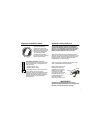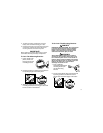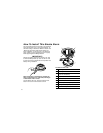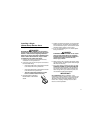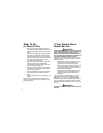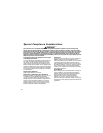
15
IMPORTANT!
Most carbon zinc batteries have an average service
life of 1 year; most alkaline batteries have an average
service life of 1-2 years; most Lithium batteries have
an average service life of 6-10 years. Actual service
life depends on the smoke alarm and the
environment in which it is installed. All the batteries
specified above are acceptable replacement
batteries for this unit. Regardless of the
manufacturer’s suggested battery life, you MUST
replace the battery immediately once the unit starts
“chirping” (the “low battery warning”).
If This Smoke Alarm
Sounds
If the alarm sounds and you are not testing it, it is
warning you of a potentially dangerous situation
that requires your immediate attention.
WARNING!
NEVER ignore any alarm. Ignoring the alarm may
result in injury or death. If the unit alarms and you
are not absolutely certain of the source of the
smoke, get everyone out of the house immediately.
Responding To An Alarm
If the unit alarms and you are not absolutely certain of
the source of the smoke, get everyone out of the
dwelling immediately. Stay calm and follow your family
escape plan. Stay as low to the ground as possible,
and cover your mouth with a damp cloth. Never open
a door before testing to see if it is hot. Call the Fire
Department from outside, and give them your address
then name. Read “What To Do In Case Of Fire” at the
end of this manual for more information.
If the unit alarms and you are certain that the source
of smoke is not a fire—cooking smoke or an
extremely dusty furnace, for example—open a
nearby window or door and fan the smoke away
from the unit (Model 4120SB only: use the Silence
Feature to silence the alarm). This will silence the
alarm, and once the smoke clears the unit will reset
itself automatically.
N
OTE:
When an interconnected system of AC powered units
is in alarm, the alarm indicator light on the unit(s) that
initiated the alarm will blink rapidly. It will remain OFF
on any remaining units.
CAUTION!
Never disconnect the AC power to quiet an
unwanted alarm. Disconnecting the power disables
the alarm so it cannot sense smoke. This will
remove your protection.
DANGER!
ELECTRICAL SHOCK HAZARD: Attempting to
disconnect the power connector from the unit
when the power is on may result in electrical
shock, serious injury or death.



